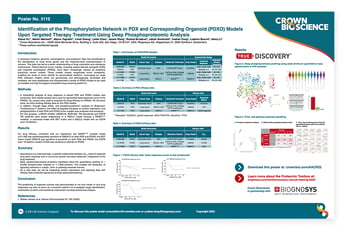- Our Services
- Platforms
- Target Solutions
- Technologies
- Service Types
- Our Science
- About Us
- Contact us
Xiaoxi Xu, Martin Mehnert, Marco Tognetti, Limei Shang, LeileiChen, Jessie Wang, Roland Bruderer, Jakob Vowinckel, Yuehan Feng, Ludovic Bourré, Henry Li In precision medicine, genomic, transcriptomic, and proteomic data has contributed to the identification of novel driver genes and the molecular-level characterization of cancers. These data have led to a better understanding of drug modulation and resistance mechanisms. Patient-derived tumor models, including patient-derived xenograft (PDX) and organoid counterparts (PDXO), have been increasingly viewed as predictive preclinical cancer models.
In precision medicine, genomic, transcriptomic, and proteomic data has contributed to the identification of novel driver genes and the molecular-level characterization of cancers. These data have led to a better understanding of drug modulation and resistance mechanisms. Patient-derived tumor models, including patient-derived xenograft (PDX) and organoid counterparts (PDXO), have been increasingly viewed as predictive preclinical cancer models.
These models closely recapitulate tumor complexity, enabling the study of tumor identity for personalized medicine. Leveraging our large PDX collection models which are genomically and phenotypically annotated and validated, we have established and characterized a series of PDXO models to be used as scalable and highthroughput-compatible drug screening platforms.
Your privacy is important to us.
We'll never share your information.
© 2025 Crown Bioscience. All Rights Reserved.
Privacy Policy | Imprint | Terms of Service | Privacy Preferences


© 2025 Crown Bioscience. All Rights Reserved. Privacy Policy
2023-02-19
2022-04-05
landing_page
PDX/Databases